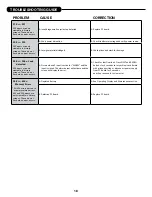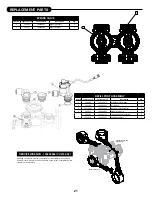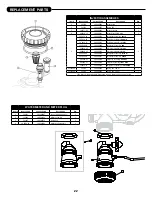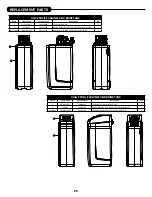
10
FLUSHING OF SYSTEM:
To flush the system of any debris and air after installation is complete, please perform the following steps:
1. Rotate bypass handles to the bypass mode
(see Fig. 2 of page 4)
.
2. Turn on inlet water and check for leaks in the newly installed plumbing.
3. Fully open a cold water faucet, preferable at a laundry sink or bathtub without an aerator.
4. Wait two to three minutes or until water runs clear, then turn water off and follow start-up instructions.
Below is the name of each cycle as it appears on the screen with a description of the cycle position. The timing of each cycle will vary
depending on the unit size as set from the factory.
Name of Cycle
Description
FILL
BRINE
TANK
FILL
SOFTENING
SOFT
WATER
BRINE
MAKING
REGENERANT DRAW UP
BRINE DRAW
BACKWASH
BACKWASH
RINSE
FAST
RINSE
The system is now ready for filling with water and for testing.
1. With the softener in the bypass mode
(Fig. 2 on page 4)
and the control valve in normal operation where the display shows either the
time of day or the gallons remaining, manually add 3” of water to the brine tank.
NOTE:
If too much water is put into the brine tank during softener start up, it could result in a salty water” complaint after the first
regeneration.
During the first regeneration the unit will draw out the initial volume of brine/regenerant and refill it with the correct preset amount.
2. With the softener in bypass mode, press and hold the
�����
button until the motor starts. The display will indicate the unit is in the
regeneration mode. Release button. The display reads “FILL” and the remaining time in this step is counting down. Since the brine tank was
already filled in Step 1 press
�����
again and the display will read SOFTENING 240 (during a full regeneration this will be a 4 hour period
for salt to dissolve). Press
�����
again to put the valve into “RINSE.” Once valve has stopped in this position, push
�����
again and the
valve will advance to “REGENERANT DRAW UP” position. Once this position is observed, push
�����
again and the valve will advance to the
“BACKWASH” position. Once valve has stopped in this position, unplug the transformer so that the valve will not cycle to the next position.
Open the inlet handle of the bypass valve slightly, allowing water to fill the tank slowly in order to expel air.
CAUTION:
If water flows too rapidly, there will be a loss of media to the drain.
3. When the water is flowing steadily to the drain without the presence of air, slowly open the inlet valve to the fully open position.
Restore power and momentarily press the
�����
button to advance the control to the “RINSE” position. Observe the water at the
drain to ensure it is free of debris, particles and media from the system. Once free of particles, momentarily press
�����
again and the
controller will advance to the service position.
4. With the bypass now in the diagnostic mode
(Fig. 3 on page 4)
, check to verify that all cycles have proper water flow. Follow Steps 2-3
on this page again, checking for proper flows during each cycle. Pay special attention to the UPFLOW BRINING cycle. Disconnect brine
line from the safety float valve in the brine tank and check for a vacuum. After proper confirmation, reconnect brine line, making sure
to tighten securely.
5. After advancing through the rest of the regeneration steps and upon returning to the service position, place bypass valve into the normal
operating mode
(Fig. 1 on page 4)
by opening the outlet bypass handle. The unit is now in normal operating position.
6.
CONDITIONING OF MEDIA:
To flush any remaining debris and air from the system again:
1. Full open a cold water faucet, preferably at a laundry sink or bathtub without an aerator.
2. Wait two to three minutes or until water runs clear, then turn water off.
3. Turn on hot water and check for air, then turn water off after air is discharged.
7.
SANITIZING OF UNIT UPON INSTALLATION AND AFTER SERVICE:
At this time, it is advised to sanitize the softener:
1. Open brine tank and remove brine well cover.
2. Pour 1 oz. of household bleach into the brine well.
3. Replace brine well cover.
NOTE: Avoid pouring bleach directly onto the safety float components in the brine well.
Unit sanitizing will be complete when the first cycle is run and the bleach is flushed from the unit.
8. Check time of day. Start-up is now complete.
STARTUP INSTRUCTIONS
FOR UPFLOW REGENERATING UNITS











































